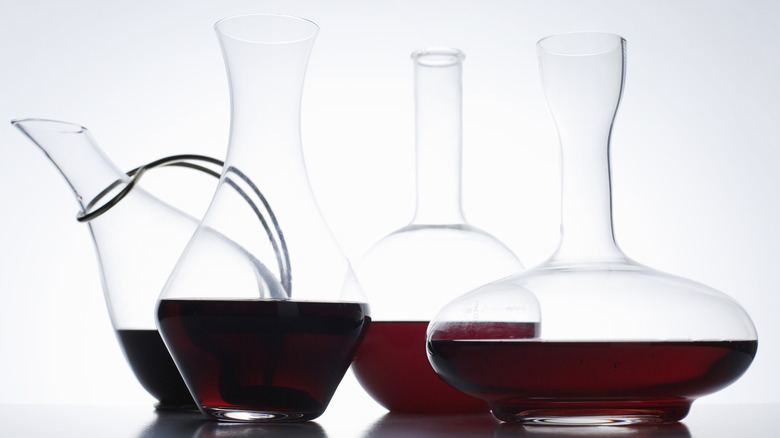How To Know When To Decant Your Wine
We may receive a commission on purchases made from links.
You could live two lifetimes and still never learn everything there is to know about wine. The centuries-old beverage has its share of experts (using snobby wine terms is kinda fun), but if you're just an everyday Joe (or Josephina) who enjoys a glass with dinner or a tasting tour now and then, the word "decanting" might seem fraught with mystery and intimidation. Decanting is actually a super simple act — it's just pouring wine from its bottle into something else, typically a decanter, which tends to be glass, with a thinner neck that leads into a wider bottom. But how do you know when your bottle of wine should be decanted or not?
A good rule of thumb is that most red wines, regardless of their age, should be decanted: Older wines, to help separate the sediment from the rest of the vino, and younger wines, to expose it to oxygen, which enhances its flavors and aromas. White wines don't tend to need decanting, but — and this goes for any bottle of wine you might open — if you take a first sip and something is off, and you just can't put your finger on it, try decanting it before drinking any more.
The one exception to the "most red wines" rule is a vino that's hit the half-century mark or has gone beyond. There is a delicacy to wine that is over the age of 50 that could be disrupted by the introduction of too much oxygen.
How to go about decanting your wine
First things first: You'll need a decanter, which is different from a carafe, as it is specifically made to allow for maximum oxygenation. There are four different types, standard, cornet, duck, and swan (like this beautiful swan-shaped decanter from NUTRIUPS), and if you're decanting young wine, you'll just pour it from the bottle into the new vessel. If you're decanting to separate an older wine from the sediment at the bottom, you should pour slowly, staying aware of where the sediment is; tilt the bottle back up to upright as soon as you notice even the barest spec of sediment entering the decanter.
There is no set time for how long your wine needs to decant; some need just half an hour, while others have to be exposed to oxygen for over two hours in order to reach the fullness of their flavors. Give it a taste when you first open it, then again after 30 minutes, and if it doesn't taste any different, let it rest and aerate for half an hour more. It's a lot of "taste and see," which hey, is part of what makes wine so fun to drink, right? (Alternatively, if your wine has actually gone bad, no amount of decanting will help it.)

